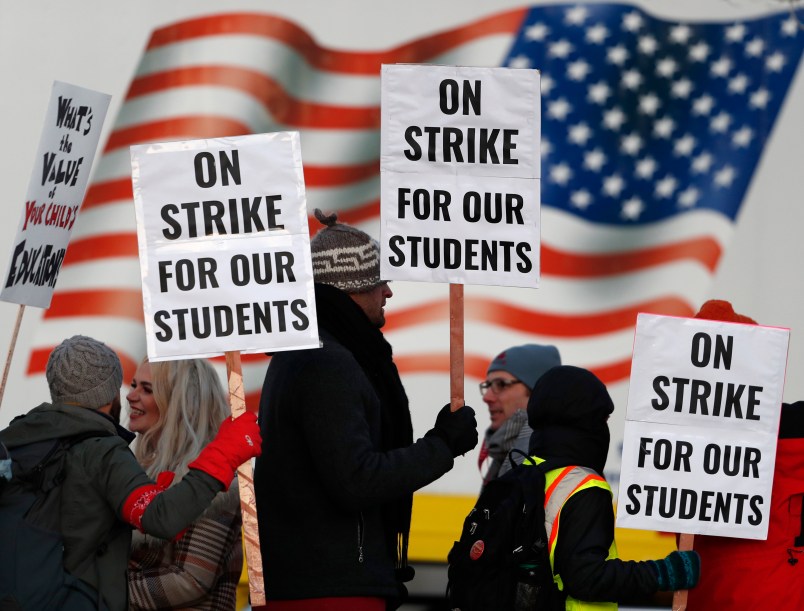DENVER (AP) — Denver teachers and district leaders were trying to end a strike over pay Tuesday with the help of a federal negotiator.
The teachers are following the lead of educators across the country by donning red amid strikes and protests for better pay and working conditions.
All schools remained open and staffed by administrators, substitutes and teachers not participating in the strike. At the start of the talks, superintendent Susana Cordova acknowledged that students were not getting the kind of instruction they normally would and said she was committed to reaching a deal to end the strike.
Lead union negotiator Rob Gould interrupted to tell her, “You can’t do the job without us.”
The negotiations began with discussions over changing Denver’s pay system to more closely resemble other districts that allow teachers to advance in pay based on experience, education and training. Both sides met publicly and in private to discuss proposals.
The talks are scheduled to last until 8 p.m.
Preliminary reports from the school district indicate 58 percent of teachers did not report to work on Tuesday, slightly more than on the first day of the strike Monday.
The walkout came about a year after West Virginia teachers launched the national “Red4Ed” movement with a nine-day strike in which they won 5 percent pay raises. Most recently, Los Angeles teachers held a six-day strike last month.
There are 71,000 students in district-run schools. Another 21,000 are enrolled in charter schools unaffected by the strike.
Lily Eskelsen Garcia, president of the National Education Association, told a crowd of picketing teachers outside the state Capitol on Monday that theirs was the latest in a national movement to provide just compensation to educators.
“You are unique here in Denver because here you are saying, ‘Can I just know what I’m being paid?'” she said. “Let me tell you: You are going to change this.”
The dispute is over the school district’s incentive-based pay system. The district gives bonuses ranging from $1,500 to $3,000 a year to teachers who work in schools with students from low-income families, in schools that are designated high priority or in positions that are considered hard to staff, such as special education or speech language pathology.
The union is pushing to lower or eliminate some of those bonuses to free up more money that would be added to overall teacher pay. The district sees the disputed bonuses as key to boosting the academic performance of poor and minority students.
Kimberly Beckeman, a ceramics and sculpture teacher at South High School, said she cried when the union announced teachers would go ahead and strike after 15 months of negotiations. She said she did not want to leave her students, but it was time to act.
“It’s what’s right. It’s not ideal. I don’t want to be out here,” she said on a picket line outside the school Monday.
Teachers say the reliance on bonuses leads to high turnover, which they say hurts students, and that spending money on smaller class sizes and adding support staff, like counselors, is the best way to help disadvantaged students.
The district has proposed raising starting teacher pay from $43,255 to $45,500 a year. That’s $300 a year less than the union’s proposal, which would add $50 million a year to teacher base pay, according to union officials.
___
Associated Press writers P. Solomon Banda and James Anderson in Denver contributed to this report.







Could this AP article be less informative?
It’s as informative as local news from a Denver based website
And we wonder why people vote on the basis of demagogues.
I’ve never been a teacher but like most people I’ve had friends who were, and the common complaint was underpaid and overworked. On top of the complaints of free spending school administrators.
Curious: what agency provides federal negotiators? Is this a normal role, or does someone get dragooned when the need arises?
These seem like factual claims that respond to objective evidence. There must be academic studies out there that could elevate this dispute beyond dueling opinions. Perhaps the data aren’t conclusive, perhaps the case studies don’t fit exactly, but I swear to god I’m sick of the media just repeating verbatim whatever disputants say as though their positions are irreducible.
It’s possible one party is full of shit. If Trump can sext with Putin 24/7 from across the globe, surely a reporter can get a disinterested expert on the phone to weigh in and provide some context.